Related Research Articles
Reparations for slavery is the application of the concept of reparations to victims of slavery or their descendants. There are concepts for reparations in legal philosophy and reparations in transitional justice. In the US, reparations for slavery have been both given by legal ruling in court and/or given voluntarily by individuals and institutions.

From the first United States Congress in 1789 through the 116th Congress in 2020, 162 African Americans served in Congress. Meanwhile, the total number of all individuals who have served in Congress over that period is 12,348. Between 1789 and 2020, 152 have served in the House of Representatives, 9 have served in the Senate, and 1 has served in both chambers. Voting members have totaled 156, with 6 serving as delegates. Party membership has been 131 Democrats and 31 Republicans. While 13 members founded the Congressional Black Caucus in 1971 during the 92nd Congress, in the 116th Congress (2019-2020), 56 served, with 54 Democrats and 2 Republicans.
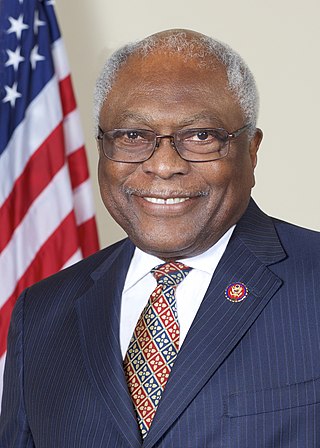
James Enos Clyburn is an American politician and retired educator serving as a Democratic member of the U.S. House of Representatives from South Carolina. He previously as House Majority Whip between 2007 and 2011 and between 2019 and 2023. Clyburn also served as House assistant Democratic leader from 2011 to 2019 and again from 2023 until he stepped down in 2024.
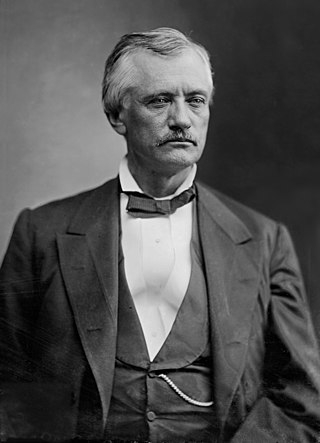
John Tyler Morgan was an American politician who was a brigadier general in the Confederate States Army during the American Civil War and later was elected for six terms as the U.S. Senator (1877–1907) from the state of Alabama. A prominent slaveholder before the Civil War, he became the second Grand Dragon of the Ku Klux Klan in Alabama during the Reconstruction era. Morgan and fellow Klan member Edmund W. Pettus became the ringleaders of white supremacy in Alabama and did more than anyone else in the state to overthrow Reconstruction efforts in the wake of the Civil War. When President Ulysses S. Grant dispatched U.S. Attorney General Amos Akerman to prosecute the Klan under the Enforcement Acts, Morgan was arrested and jailed.
Following the end of Reconstruction, African Americans created a broad-based independent political movement in the South: Black Populism.
The Redeemers were a political coalition in the Southern United States during the Reconstruction Era that followed the American Civil War. Redeemers were the Southern wing of the Democratic Party. They sought to regain their political power and enforce White supremacy. Their policy of Redemption was intended to oust the Radical Republicans, a coalition of freedmen, "carpetbaggers", and "scalawags". They were typically led by White yeomen and dominated Southern politics in most areas from the 1870s to 1910.
The civil rights movement (1896–1954) was a long, primarily nonviolent action to bring full civil rights and equality under the law to all Americans. The era has had a lasting impact on American society – in its tactics, the increased social and legal acceptance of civil rights, and in its exposure of the prevalence and cost of racism.
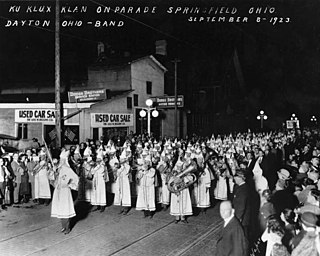
The nadir of American race relations was the period in African-American history and the history of the United States from the end of Reconstruction in 1877 through the early 20th century, when racism in the country, especially anti-black racism, was more open and pronounced than it had ever been during any other period in the nation's history. During this period, African Americans lost access to many of the civil rights which they had gained during Reconstruction. Anti-black violence, lynchings, segregation, legalized racial discrimination, and expressions of white supremacy all increased. Asian Americans were also not spared from such sentiments.
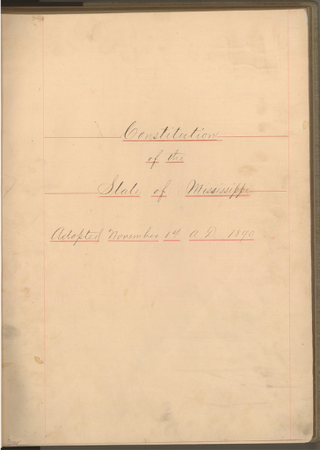
The Constitution of Mississippi is the primary organizing law for the U.S. state of Mississippi delineating the duties, powers, structures, and functions of the state government. Mississippi's original constitution was adopted at a constitutional convention held at Washington, Mississippi in advance of the western portion of the territory's admission to the Union in 1817. The current state constitution was adopted in 1890 following the reconstruction period. It has been amended and updated 100 times in since its adoption in 1890, with some sections being changed or repealed altogether. The most recent modification to the constitution occurred in November 2020, when Section 140 was amended, and Sections 141-143 were repealed.
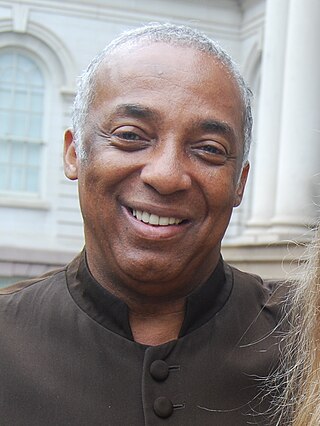
Charles Barron is an American activist and politician who currently serves in the New York City Council, representing Brooklyn's 42nd district. He previously held the same seat from 2002 to 2013, and served in the New York Assembly from the 60th district between 2015 and 2022.

The 1960 Louisiana gubernatorial election was held on April 19, 1960.
The Louisiana Democratic Party is the affiliate of the Democratic Party in the state of Louisiana.
The Jim Crow laws were state and local laws introduced in the Southern United States in the late 19th and early 20th centuries that enforced racial segregation, "Jim Crow" being a pejorative term for an African American. Such laws remained in force until 1965. Formal and informal segregation policies were present in other areas of the United States as well, even as several states outside the South had banned discrimination in public accommodations and voting. Southern laws were enacted by white-dominated state legislatures to disenfranchise and remove political and economic gains made by African Americans during the Reconstruction era. Such continuing racial segregation was also supported by the successful Lily-White Movement.
Brian Kelly is an American historian and a lecturer in US history, teaching at Queen's University Belfast in Northern Ireland. His work is concerned mainly with labor and race in the American South, although much of his most recent scholarship focuses on the formative struggles around slave emancipation during the American Civil War and the Reconstruction Era that followed.
The civil rights movement (1865–1896) aimed to eliminate racial discrimination against African Americans, improve their educational and employment opportunities, and establish their electoral power, just after the abolition of slavery in the United States. The period from 1865 to 1895 saw a tremendous change in the fortunes of the Black community following the elimination of slavery in the [[Southern United States|South].

The 1952 United States presidential election in North Carolina took place on November 4, 1952, as part of the 1952 United States presidential election. North Carolina voters chose 14 representatives, or electors, to the Electoral College, who voted for president and vice president.
Juanita Bynum is an American gospel singer, author, and pastor.

African Americans were fully enfranchised in practice throughout the United States by the Voting Rights Act of 1965. Prior to the Civil War and the Reconstruction Amendments to the U.S. Constitution, some Black people in the United States had the right to vote, but this right was often abridged or taken away. After 1870, Black people were theoretically equal before the law, but in the period between the end of Reconstruction era and the passage of the Civil Rights Act of 1964 this was frequently infringed in practice.

Woodrow Wilson (1856–1924) was the prominent American scholar who served as president of Princeton University from 1902 to 1910, as governor of New Jersey from 1911 to 1913, and as the 28th president of the United States from 1913 to 1921. He was a Democrat. While Wilson's tenure is often noted for progressive achievement, his time in office was one of unprecedented regression in racial equality.

In the context of racism in the United States, racism against African Americans dates back to the colonial era, and it continues to be a persistent issue in American society in the 21st century.
References
- ↑ "On Wealthy Island, Being Black Means Being a Police Suspect" By TIMOTHY EGAN, New York Times, May 10, 1998
- ↑ "Endorsements". Scott Campaign website. Archived from the original on 2010-01-25. Retrieved 2010-05-15.
- ↑ "Archived copy" (PDF). cache.trustedpartner.com. Archived from the original (PDF) on 23 December 2011. Retrieved 12 January 2022.
{{cite web}}: CS1 maint: archived copy as title (link)